Even four years after is original release, The Dark Knight casts a pretty big shadow. Not only is it the best Batman movie ever produced, and easily one of the best stories to feature the character in any medium, it’s also a wonderful piece of cinema on its own terms. Christopher Nolan is an astounding craftsman, and one who constructed his superhero sequel without ever feeling the need to dumb down. The Dark Knight is a wonderfully effective and stunningly constructed piece of popcorn cinema, but it’s also the most profound and engaging (and, importantly, even-handed) meditations on the War of Terror that Hollywood has produced. It’s bold and accessible, but it’s also intelligent and engaging. More than an astoundingly impressive blockbuster, it’s just a superb piece of cinema.
Even divorcing The Dark Knight from its eponymous character and its status as one of the most financially successful movies of all time, it’s a very careful put together film. Watching the movie time and again, one can sense the care and craft that went into putting The Dark Knight together. Ironically, despite its countless twists and occasionally dramatic reversals, The Dark Knight is the movie in Nolan’s filmography that probably plays most fair with its audience. (In contrast to its direct predecessor, The Prestige, which I love, but is full of rather wonderful conscious misdirection.)
Virtually every major plot twist or plot point from the film is painstakingly choreographed, but in such a way that it only becomes obvious on watching it again. “You’ve known Rachel her whole life?” Dent asks Alfred. “Not yet,” Alfred responds with a grin, a gag that becomes a bit harsher the second time you watch the film. Similarly, you spot the little connections and threads. The Joker, for example, probably used the same school bus from the opening bank robbery to abduct the patients from the hospital. Virtually everything introduced is of use later on, even when it seems innocuous or trivial. Despite running well over two hours, there’s a sense that Nolan has not wasted a single frame of his work here.
From a film making perspective, the whole thing is remarkably well put together. Like in Batman Begins, Nolan edits the hell out of Batman in combat, a wonderfully effective technique that perfectly captures the character’s approach to combat. He should be like a movie monster, attacking so quick that it’s a blur. Nolan’s mastery of the camera is impressive. He knows when to keep it focused and when to widen out. He knows how and when to move it in order maintain tension. (There’s a wonderful argument between Gordon, Dent and Batman on the roof of the GCPD, borrowed from Jeph Loeb’s The Long Halloween; there’s also the way that he keeps us off-balance whenever the Joker is in play.)
It’s hard to think of a better technically constructed blockbuster in recent memory. There are a few awkward missteps, but they’re trivial. A quick cut, for example, would have explained what happened to the Joker after Batman dived out the window. There must be a more logical way for Batman to investigate an attempt on the mayor that taking a fingerprint off a shattered bullet. Still, these are minor distractions, and it’s to Nolan’s credit that the movie rips along so quickly that you scarcely notice them.
Special mention must got out to James Newton Howard and Hans Zimmer for their work in putting together the film’s score. Many of the core themes from Batman Begins carry over, of course, but there’s a fantastic aural soundscape for the Joker, one that forces the listener to try to discern rhyme and patterns in a piece of music that seems as random and chaotic as the character himself. It’s absolutely fantastic, and I can’t wait to see what they have in store for The Dark Knight Rises.
Still, beyond its technical excellence, The Dark Knight works on several levels. The most obvious is the level of social and political commentary. I have to admit, I’m normally a bit reluctant to see political commentary in these sorts of films – if only because movies tend to over-simplify issues, and you end up with movies like Rendition of Lions for Lambs, where the director and producers might as well be shouting at you through a speaker system. It’s very tough to find any real level of nuance in movie politics – especially dealing with something as recent as the War on Terror. Understandably, the wounds are still fresh.
However, The Dark Knight works because it’s actually open-minded. It isn’t a political diatribe from Nolan or any of his collaborators. Instead, it’s an open book that the viewer can examine and reach their own conclusions on. How does one respond to a threat like the Joker? The character is, on a very basic level, a “terrorist.” He is referred to as such, and even broadcasts grisly executions to Gotham’s public, while making demands. And every attempt to counter him plays directly into his hands.
The Joker isn’t a bank robber or anything as cliché as that. His objectives can’t be measured in physical terms. He wants a philosophical victory, much like any extremist. The only way to really combat him is to compromise society’s ideals and principles, thus ensuring that he wins, even if he loses. Nolan knows that you can’t solve the moral dilemma of confronting terrorism within a two-hour movie, and it’s arrogant to even attempt to do so. Instead of providing stern po-faced lectures, the director instead broaches questions.
What are we willing to sacrifice? Is it possible for one person to take that hit for the greater good? Most interestingly, and most controversially, is the idea that a lie can be justified. If you cannot physically overcome and philosophically defeat that threat to the fabric of society, is it justified to tell a lie to make people feel better? Bruce and Gordon do it for Dent. Alfred does it for Bruce. The only one who doesn’t is Lucius Fox. Batman tells Gordon to lie, “Because sometimes… the truth isn’t good enough. Sometimes people deserve more. Sometimes people deserve to have their faith rewarded.” Is the lie justified if that reward hasn’t been truly earned?
It’s a tough question, and Nolan leaves it to his audience to arbitrate. Karma means that Bruce is living in his own fun house version of that world, where Alfred has made the same call for him that he made for Gotham. Would Bruce want that? Would he have decided differently if he knew that it would happen to him as well? What would the people of Gotham want to know, and what gives Bruce the authority to make the decision for them? It’s far from clear-cut, and Nolan deserves a great deal of credit for his work here.
However, more than it’s nuanced wider sociological commentary, the movie really works as perhaps the quintessential Batman story, finding the core of the character and his world and boiling it down into one comprehensive two-and-a-half-hour package. In fact, I do worry about The Dark Knight Rises, if only because this film so perfectly encapsulated all of the character’s core themes and ideas. It’s very easy to argue that The Dark Knight belongs to Heath Ledger as the Joker, but I still think it’s very clearly a Batman story. The Joker only works in the film as a counterpoint to Batman – a contrast and a commentary on what Batman represents.
Even the Joker’s presence is a logical extension of the Batman concept. Although Nolan doesn’t anchor the character explicitly to Batman in the way that Tim Burton did, the implication is clear. Batman created a climate where somebody like the Joker could thrive. “See,” the Joker warns Gotham in one of his videos, “this is how crazy Batman’s made Gotham!” When the Joker points out he’s here to stay, he makes perhaps the most honest reference to his back story to be found in the film. “What would I do without you? Go back to ripping off mob dealers?”In an ordinary Gotham, one without Batman, the Joker is just an armed robber. However, thanks to Batman, he’s found a place where he can shine.
Gordon’s wife admonishes the Caped Crusader, yelling, “You brought this craziness on us!” She’s not wrong. Despite the fact that he claims to lack a plan, the Joker has very clearly been taking notes on Batman’s method of operation. Before he reveals himself, we’re told that he wears make-up “to scare people – you know, war paint.” Much like Batman, he favours “theatricality and deception” as his primary weapons. His associates seem to cobbled together from the criminals who escaped Arkham at the end of Batman Begins, probably driven around the bend by Crane’s fear toxin. It’s highly likely he controls them through fear, just as he controls the mob through fear.
When Batman confront Maroni about the Joker, Maroni reveals that the criminals are actually more scared of the Joker than of Batman. “No one’s gonna tell you nothin’. They’re wise to your act. You got rules. The Joker, he’s got no rules. No one’s gonna cross him for you.”Indeed, the breathtaking opening heist demonstrates that the Joker has learnt one thing in particular from Batman: the mob is not untouchable.
The Joker dismantles and neuters the mob in the same way that Batman does. “You’re trying to hit them where it hurts,” Dent comments on the Batman and Gordon partnership, “their wallets.” The Joker is very clearly doing the same thing. Particularly since he doesn’t actually need the money. One of the areas of methodology where the movie distinguishes Batman from the Joker is that the Joker doesn’t need money.
“See, I’m a man of simple tastes,” he boasts at one point. “I enjoy dynamite, and gunpowder, and… gasoline! And you know the thing they have in common? They’re cheap.”Bruce is dependent on his multinational company in order to make Batman work, but the Joker has no such limitations. The only reason to rob that mob bank in the opening sequence is to take the money from the mob, not to keep it for himself. And to prove that he can.
The movie explicitly compares and contrasts Batman and the Joker repeatedly, portraying them as (naturally) opposite concepts. Both make a theatrical entrance to Dent’s fundraiser, demanding “where’s Harvey Dent?” while tossing champagne out of a flute. Despite the Joker’s assertion that he improvises everything (“do I look like a guy with a plan?”), it’s very clearly a lie. His schemes are carefully structured like nesting dolls within one another. His attempt to kill Coleman Reese provides a smokescreen to blow up a hospital, which allows him to unleash Harvey Dent. Just like Batman, the Joker has a clear objective, and a strategic way of accomplishing it.
However, the movie contrasts Batman and the Joker as far as their belief systems go. Naturally, for a movie featuring Two-Face, the movie meditates on chance, luck and fate. It is also concerned with ideals and beliefs. The manager of the Gotham National Bank yells at the Joker, “Criminals in this town used to believe in things. Honor. Respect. Look at you! What do you believe in, huh? What do you believe in?” At it’s core, The Dark Knight is about the philosophical conflict between two belief systems.
The Joker believes the worst in people. Batman believes in the best. (I’ve always found it delightfully ironic considering their themes.) The Joker’s belief system, and one he seeks to validate, is in direct opposition to Bruce. Bruce believes that by dressing up as a bat and shining a light in the sky, he can inspire people. The Joker believes that people left to their own devices are little more than animals. “They’re only as good as the world allows them to be. I’ll show you, when the chips are down, these… these civilized people? They’ll eat each other.”
There’s a recurring image associated with the Joker – he seems believe that the rest of humanity is nothing more than a pack of wild dogs. He compares himself to “a dog chasing cars.” When he kills the Chechen, he’s sure make a point using the mob boss’ pets, demanding, “Why don’t we cut you up into little pieces and feed you to your pooches? Hmm? And then we’ll see how loyal a hungry dog really is. It’s not about money… it’s about sending a message. Everything burns!”
The Joker’s biggest philosophical victory comes from breaking Batman. He stands in the middle of the road, as Batman charges at him on the Batpod, muttering, “I want you to do it. C’mon! Hit me!” Even if he died, the Joker would win, because he would have broken Batman. It’s telling that Rachel’s post-mortem letter to Bruce appeals to his faith in humanity – because that’s really what divides Bruce from the Joker. “If you lose your faith in me, please keep your faith in people.” Batman has that faith. The Joker doesn’t.
Of course, the movie hints that Joker’s philosophy is just posturing – that he underwent some psychological trauma that broke him, and he’s desperately trying to prove that it wasn’t just him who was like that. The character is very rarely out of control, but there are moments when he loses it. When his victim refuses to acknowledge him, he yells in his most aggressive tone, “Look at me!” When he’s accused of being crazy, he firmly and dejectedly rejects the label. “I’m not. No, I’m not.” When the bomb on the freighters doesn’t go off, he seems genuinely peeved. “You can’t rely on anybody these days, you gotta do everything yourself, don’t we?”
Batman has him pegged towards the end of the film when he comes a realisation about the nature of the Joker’s philosophy. It’s not about proving anything to the world, it’s about justifying his own conduct. “What were you trying to prove?” Batman asks when the Joker’s plan backfires because he couldn’t predict human altruism. “That deep down, everyone’s as ugly as you? You’re alone!” It’s interesting, because that’s actually another significant difference between Bruce and the Joker.
The Joker’s motivations are to prove that society operates a certain way so as to prove himself correct. Batman hopes to prove society operates in the opposite way so that society itself can improve. It is pretty basic to suggest that the villain is selfish in contrast to the hero being selfless, but I still think it’s an interesting enough interpretation that it merits a tiny bit of discussion. I really think that Nolan nailed both the Joker and the dynamic between Batman and the Joker.
Batman is so interesting to the Joker because he represents the idea that you can compromise your morals while still holding on to them. Batman operates outside the system, outside the law, but he still rigidly adheres to his own principles and morality. (in this case, it’s his “one rule” – his stubborn refusal to kill.) To the Joker, this is a fascinating idea. Batman dresses as a bat and runs his own extraordinary rendition service, so how can the character continue to hold on to his principles? Surely Batman should be so far outside the system that he can’t help but accept the Joker’s logic that society is one big lie. (Or joke.)
If Batman can do maintain his princples, and can endure immeasurable suffering over the source of doing so, then his very existence is a direct rebuttal to the Joker’s philosophy.
I have one rule.
Oh, then that’s the rule you’ll have to break to know the truth.
Which is?
The only sensible way to live in this world is without rules.
The difference, of course, is that the Joker ironically believes in”all or nothing.” Either society and its order exist, or they don’t. If one of the tenants of society can be seen to be unstable or arbitrary then – to the Joker – the whole system is wrong.
That’s what draws the Joker to Dent, and why Dent is so easily corrupted by the Joker’s rhetoric. Dent similarly seems to believe in “all or nothing” – that simply duality of “good and evil.” Batman and Gordon, on the other hand, operate on a more pragmatic basis. Batman can exist outside the system to reinforce it. Gordon can work with crooked cops for the greater good. As Gordon tells Dent, “I don’t get political points for being an idealist, I have to do the best I can with what I have.” Batman does something similar. The Joker can’t – which is somewhat ironic. For all his cynicism and his manipulation of human nature, the Joker can’t see the shades of grey.
It’s all been said before, but Heath Ledger’s Joker is fantastic, and was deserving of the Academy Award. Literally every part of the performance, from his modulated sing-song voice to the way he licks his scars, is brilliantly and perfectly constructed to build one of the more memorable movie characters of the past decade. Ledger has that rare gift where he can ensure that the Joker is both terrifying and hilarious, often at the same time. He even makes potentially cheesy moments like “very poor choice of words” work fantastically. There is a reason why you can quote virtually any line of Joker dialogue from this film and people will immediately recognise the source.
My favourite Joker moment of the entire script, and one that reveals a wonderful understanding of his character and concept, is a small one buried within that fantastic interrogation room sequence, as Batman is “interrogating” the prisoner. The Joker knows where Dent and Rachel are, but he’s not talking. And Batman is so ridiculously completely out of his element that he can literally do nothing but keep pounding the criminal. The Joker finds this hilarious, and it’s the moment you realise that the Joker is in complete control, even though he’s having several kinds of sugar knocked out of him.
“You have nothing,” the Joker laughs, “nothing to threaten me with! Nothing to do with all your strength!” The Joker can’t be intimidated by Batman. Batman’s routine doesn’t work on him. It’s the perfect encapsulation of why the joker works so well as a foil for Batman, because he’s a character Batmancan’t defeat by beating him to a pulp or by deploying the necessary plot device. Everything Bruce travelled the world to hone is completely useless against the fiend. And it’s brilliant.
(Incidentally, I love the small cameo from Cillian Murphy as the Scarecrow at the start. It’s fun to see how low the character has fallen, but also to note that – appropriately enough – the character is scared of Batman. When Batman arrives, his first response is to get the hell out of the parking garage. It is not a bad plan. I also love that he is able to recognise Batman’s modus operandi. As the Sons of Batman attack with their guns, he deduces, “That’s not him.” When the Tumbler arrives he gets a fantastically glib, “That’s more like it.” I also love how he’s such a douchebag drug dealer, much like he was a douchebag psychiatrist. Even by drug dealer standards, he’s pretty sociopathic.)
While the Joker gets the lion’s share of the attention, this is still very clearly Batman’s movie. Ledger might steal the show, but Bale is as good as ever as Batman. The Dark Knight works so well because it essentially reverses the dynamic of the first film. Batman Begins was about Bruce unleashing something completely unpredictable on Gotham. In The Dark Knight, Gotham returns the favour. There’s a sense that the Joker situation is only worsened by Bruce’s hubris.
He presumes he knows everything Gotham can throw at him, so he ignores the Joker. When Gordon raises the issue, Batman pushes the psychotic clown way down the “to do” list. “One man or the entire mob? He can wait.” I’m going to just come out and say it: bad call, Bruce. In fact, Bruce seems completely surprised by this whole turn of events, seeming morally outraged at the idea that the mob might try something underhanded in response to his arrival as Batman.
Targeting me won’t get their money back. I knew the mob wouldn’t go down without a fight, but this is different. They crossed the line.
You crossed the line first, sir. You squeezed them, you hammered them to the point of desperation. And in their desperation, they turned to a man they didn’t fully understand.
Criminals aren’t complicated, Alfred. Just have to figure out what he’s after.
With respect Master Wayne, perhaps this is a man that you don’t fully understand, either.
I actually love that exchange for several reasons. The first is that Alfred calls Bruce out on his arrogance. He phrases it politely (“with respect”), but it’s very clear that even Alfred realises that Bruce is making an error in judgement in dismissing the Joker.
I also like that Bruce uses a phrase not too dissimilar to the phrase used by Ra’s Al Ghul in dismissing criminals back in Batman Begins. (“A criminal is not complicated.”) I love that the shadow of Batman Begins hangs over the whole movie without excessively dominating it. Ra’s Al Ghul is never mentioned, but Bruce is still defined by his interactions with the character. Indeed, his decision to save the Joker at the end of this film represents massive character growth given the way that he allowed Ra’s to die at the end of Batman Begins. I’m glad that the character will return for The Dark Knight Rises.
I also love that the Joker’s final “prisoner’s dilemma” is essentially a variation on the initiation right to the League of Shadows. Ra’s offered Bruce membership if he would kill a criminal – and, if he refused, they’d both die. Both situations see the lives of criminals put in the hands of the wealthy and powerful. One person on the civilian boat states, “Those men on that boat made their choices. They chose to murder and steal.” It’s not too far removed from the line of logic Ra’s feeds to Bruce to justify killing a crook. (“He was a farmer. Then he tried to take his neighbor’s land and became a murderer.”)
Bruce is also interesting in contrast to the Joker because he’s a lot more optimistic in outlook. I love the interrogaiton of Maroni, where Batman demands the Joker’s location. “He must have friends!” Maroni seems brilliantly bemused by the question. “Friends? Have you met this guy!?” It’s a small moment, but it illustrates just how out of touch Bruce actually is, and how simplistic his understanding of the world around him must be.
It’s very clear in watching The Dark Knight that Bruce has adopted a “back for Christmas” attitude to this whole one-man war on crime thing. He tells Rachel, “You know that day you told me about, when Gotham would no longer need Batman? It’s coming.”He also clearly buys into Dent’s line about how Batman doesn’t want to be Batman forever. (Because nobody wants to be a crappy Joel Schumacher movie.)
It seems like Bruce even has a wonderfully dickish and yet strangely childishly naive plan to fix his life in short order, as soon as he finishes off the last of the mob. He believes he can hand the baton to Dent, and then immediately steal Rachel back. I assume Bruce’s internal logic was that Rachel could not love him because he was so devoted to his mission, so she’d break up with Harvey when he became devoted to that same mission. Bruce seems to have very little understanding of how human emotions work – especially those of the people around him.
In fact, he’s so desperate to finish up his time in the Batsuit that he never pauses to really think about investing all his trust in Harvey. he very clearly believes in Harvey Dent, as he claims, but he’s oblivious to the fact that Dent could never replace Batman. Bruce had to transcend mortality itself and evolve into a legend to become a universal symbol for good. Dent is still just a man. (Gordon and Batman help him ascend to the status of legend after his death.)
Batman convinces Dent, “You’re the symbol of hope I could never be. Your stand against organized crime is the first legitimate ray of light that Gotham in decades.” The problem is that Harvey could never really be that “symbol” of hope, because he’s just a man. In Batman Begins, Bruce told Alfred, “As a man, I’m flesh and blood. I can be ignored. I can be destroyed. But, as a symbol… as a symbol, I can be incorruptible, I can be everlasting.” Harvey Dent is just flesh and blood. And that’s why he falls so far by the end of the film.
Of course, Bruce’s belief that he could ever live happily ever after is childish and simplistic, and betrays an arrogance about the character. Even the Joker knows that you can’t stop being Batman. Even if you retire for eight years. (Or more, in other stories.) “Those mob fools want you gone so they can get back to the way things were. But I know the truth: there’s no going back. You’ve changed things… forever.” The Joker seems to understand that Batman hasn’t ended the game, he’s just changed the rules. Later, in a line that still feels painful given Ledger’s ultimate fate, the Joker vows, “I think you and I are destined to do this forever.”
As with Batman Begins, there’s the recurring idea of the importance of Batman as a symbol. (In contrast to Bruce as a man.) In the sequence directly following the Joker’s introduction, we see the influence that Batman has had on Gotham, and it’s more than simply beating up crooks. The hero isn’t just a physical presence – he’s a symbol and an idea. Seeing the signal, a drug dealer calls off a sale, “Nah, man, I don’t like it tonight.” His costumer appeals fruitlessly to logic, “You’ve got more chance of winning the Power Ball than running into him.”
It seems like Ra’s taught him how to engage more than a mere six thousand. The impact of Batman’s presence is profound, to the point where it even changes the habits and routines of the criminal organisations in the middle of their death throes. “I know why you choose to have your little group therapy sessions here in broad daylight,” the Joker warns Maroni. “I know why you’re afraid to go out at night; the Batman.”
And yet, underneath all that, Bruce is just a man. He carries the scars and bruises of his nights on the town. Alfred advises his young ward, “Know your limits, Master Wayne.” Bruce responds, “Batman has no limits.” Alfred reminds him, “Well, you do, sir.” In many ways, The Dark Knight explores the divide between Bruce and Batman. It’s highly unlikely that Bruce could have emotionally survived the events of The Dark Knight if he didn’t have the cushion of Batman, something larger than him that could take the punishment and the hits. After all, Dent doesn’t survive the loss of Rachel, and I suspect that’s because there’s no distinction between “Dent the man” and “Dent the legend.”
In fact, Alfred explicitly points out that Batman has a moral strength that transcends ordinary people, because of his status as a symbol and a legend. Bruce seeks advice on how to deal with the Joker’s grim ultimatum, and Alfred responds, “Endure, Master Wayne. Take it. They’ll hate you for it, but that’s the point of Batman, he can be the outcast. He can make the choice that no one else can make, the right choice.”Batman is large enough and strong enough to exist outside the system without being crushed.
It’s also worth noting that Bruce is the very human and very flawed part of the equation. He is initially suspicious of Harvey not for any significant moral transgression, but because of the company he keeps. (“Are you interested in his character or his social circle?” Alfred goads.) Since Gordon and Batman never question Dent’s morality, one suspects that his affair with Rachel was part of the reason he didn’t bring Dent into his circle of trust. This results in Lau being able to flee Gotham for Hong Kong. “Lau’s halfway to Hong Kong,” Dent advises the pair. “If you’d asked, I could have taken his passport. I told you keep me in the loop.”
Dent makes for a wonderful counterpart to Bruce – and I’m actually glad the film spends so much time on Dent as a character before his transformation into the iconic villain. Dent is constantly discussed and compared to both Bruce and Batman. He’s dating Bruce’s childhood crush, while people speculate that he might be Batman. Even Gordon jokes the Batman, “I hear he’s almost as stubborn as you are.”He’s the White Knight to Batman’s Dark Knight.
However, Dent is not Batman. I touched on it above, but Dent really lacks the complexity and sophistication that Bruce has. In fact, Harvey’s entire arc here demonstrates how essential it was for Bruce to leave Gotham and travel the world inBatman Begins, learning the necessary skills to push himself beyond a mere man. Bruce is a man and Batman is a symbol – yes, they are the same person, but there’s enough distinction there. Dent doesn’t have that divide. He doesn’t share Bruce’s ability to compartmentalise. Like the Joker, he views things in absolutist terms.
The movie devotes some time to Dent as a symbol. Batman even sees him as a suitable replacement. Both Gordon and Wayne talk about being “sold” on Harvey, as if being brought in on an idea rather than liking a person. Gordon even comments on Dent’s frequent televised appearances, joking, “That boy looks good on the tube.”To a certain extent, like Batman, Harvey Dent is an idea to be packaged, commoditised and sold to the population. The difference is that Dent lacks the pragmatism and insulation that comes from Batman. Dent can’t divorce the image of the righteous attorney from the man himself.
Dent appears to view the world in the most straightforward term, with little nuance. When he supports Batman, he does so in the strongest, most absolutist terms possible. “Gotham is proud of an ordinary citizen standing up for what’s right.” Gordon accuses Dent of playing to the cameras, of “making his name” at Internal Affairs, and the implication is that Gordon suspects Dent might not be up for the tough moral calls of front-line crime-fighting. He advises Dent, “We’re going after the mob’s life savings. Things will get ugly.” Dent’s response is so glib it’s almost condescending. “I knew the risks when I took this job, Lieutenant.” There’s no sense that he’s really thought too much about this at all.
In fact, Dent seems like a character who’d be perfectly at home in a conventional action movie, but is lost in the moral quagmire of Gotham. He’s sharp and photogenic, and he seems love making quips to the press. “I don’t know about Mr. Lau’s travel arrangements, but I’m sure glad he’s here,” he jokes at one point, and the reporters eat it up. After a brutal car chase, he even defers comment with a wry grin like he’s expecting the credits to start rolling. “I got a date with a pretty upset girlfriend.”Of course, this isn’t any other movie, and Dent’s personal hell is only really beginning.
It’s also worth noting that Dent lacks the same tethers that Bruce has. Bruce relies on Alfred for moral support and Lucius Fox to keep his own morality in check. Nolan and Bale have both refused to include Robin in these films, but I think it’s important that Bruce does have a large an influential supporting cast to tether him. Dent literally only appears to have Rachel to anchor, so her loss is even more devastating than it would be for Bruce.
I like this approach to the character, and Eckhart is great in the role. I also find it interesting that Two-Face’s coin is flipped eight times. For the first seven times, Nolan’s script adheres to a strict alternating good-bad result. Joker (good), Wuertz (bad), Maroni (good), Maroni’s driver (bad), Ramerez (good), Batman (bad) and Dent himself (good). When he flips the coin for Gordon’s son, he doesn’t catch it. However, the pattern to date would suggest that it would land on the”bad” side.
Surprisingly, after Two-Face is pushed to his death, it lands on the “good” side breaking the pattern. It’s a small moment, but I like it. It suggests that all it really takes for good to prevail is some tiny random gesture. It’s a microcosm of the entire movie, where “small” people in pivotal positions can do an inordinate amount of good. Just like the prisoner on the boat. Or the callers to the television show featuring Mister Reese. It suggests that sometimes hope can win out, and that faith can be rewarded.
I never understood the argument that The Dark Knight was a depressing film. It does have its dark moments, but I’ve always felt that good must struggle for the triumph to be worthwhile. After all, virtue that can’t withstand any challenge isn’t worth having. Dent is broken, Batman’s name is ruined, Rachel is dead. However, despite the incredible odds, Gordon and Bruce manage to preserve Gotham’s spirit and to help the city endure. It has been earned through suffering and struggle, but that means it is deserved.
I also should single out Gary Oldman’s performance as Commissioner Gordon. Gordon is perhaps my favourite character in the mythos, because he’s the most compelling. He is, after all, the sane man who makes the decision to trust Gotham to a man running around dressed as a giant Bat. When he accuses Maroni of letting “the clown out of the box”, it’s interesting to think how much of that is self-loathing being projected outward. If Gordon hadn’t trusted Batman, the Joker wouldn’t be tearing Gotham apart right now. (Of course, given the climax to Batman Begins, Gotham might not actually exist, so it’s a tough trade-off.)
Gordon carries a huge amount of personal responsibility, as he’s the one who mandates Batman. He’s the one who enables Bruce without any idea of the character’s motivations or logic. There’s a wonderful moment towards the end of the film where Gordon draws his gun on Batman, a sign that he’s really having second thoughts, and pretty much has a mental breakdown. “We have to save Dent!” he yells, his hands shaking. “I have to saveDent.”
Gordon sees all of this falling squarely on his own shoulders, and accepts moral responsibility for everything that has happened. It’s a great take on the character, and you can tell that the Joker really has him figured out. During his capture, the Joker taunts, “Does it depress you, Commissioner? To know just how alone you really are? Does it make you feel responsible for Harvey Dent’s current predicament?” Oldman is perfect in the role, and I really think that he gets overlooked, just as Gordon gets overlooked as a character.
(I do like how even a minor character like Maroni, played effortless by Eric Roberts in the best performance of his career, works as a mirror to Gordon. He’s the ordinary guy in an extraordinary situation who decides to trust a nutjob, only to have it come back and bite him. I love that Maroni is perhaps the one major character smart enough to get the hell out out of Gotham when things go South. “Don’t stop for lights, cops, nothing.”Much like Gordon, he’s also established as a family man – leaving as things get really bad to go to his wife. Again, like Gordon will do.)
I do like how Batman’s trust in Gordon is entirely absolute. During the threat to Reese, Bruce seems to trust Gordon and his cops to protect Reese from citizens. Bruce seems to be primarily concerned with potentially corrupt cops on the protection detail. (Of course, Bruce does save Gordon from a driver, but it’s only when an incident inside the jeep distracts the cops.) It’s also a nice touch that Bruce seems to recognise most of Gordon’s officers on sight.
The “dumbass Bruce Wayne” bit is a nice touch, a callback to Batman Begins in a rather effective and clever way. Nolan seems to trust viewers to remember what they saw in the last film, allowing him to only fleeting touch on them. I especially like the way that Nolan perfectly plays off the “Batman approach to combat” which was established in Batman Begins. The character’s use of misdirection and theatricality are fantastic, especially when he single-handedly storms Trump Tower.
That moment where Bruce looks like he’s trying to beat up a SWAT team, but is actually just tethering them together, leads to one of my all time favourite “kick-ass Batman moments.” Also, I adore that moment where he swings through the articulated lorry, prompting one of the Joker’s less bright henchmen to observe, “He missed!” And then the lorry flips over. (I also like how the Joker knows better than to agree.)
I do like that Nolan makes Batman a more cerebral character this time around. InBatman Begins, he was a much more reactive character. After all, a supervillain has to try to destroy a city before you can foil that plan. Here, there’s a sense that Bruce is much more proactively pursuing his war on crime. I like the way that his merger with Lau is just a front to confirm that Lau is laundering money. It suggests that Batman uses every resource at his disposal, and doesn’t just pummel criminals until they tell him about their boss.
Even Rachel works much better this time around. I don’t know if it’s the way she’s written or the fact that she’s played by Maggie Gyllenhaal, but the character has a very clear arc here. It’s been argued that she exists merely to serve as a motivation to Bruce, allowing her death to sever an emotional tether, but I think there’s something to be said for the fact that she’s the one character who never compromises. She fully understands Bruce and Harvey, perhaps even better than they know themselves.
She’s also the only character in Bruce’s social circle who is willing to call him out on any of his decisions. Like the Joker, she also realises that Bruce is pretty much Batman now. (In fact, her letter to Bruce even begins “I need to be honest.”) Ironically, despite being tied up and detonated, Rachel actually seems like much less of a damsel in distress this time around – or at least certainly more proactive and dynamic.
She doesn’t walk into an obvious trap like in Batman Begins. And I get the sense that I would have liked her much more in that film had she kicked Crane in the nuts during that chase sequence, like she does here. She calls Bruce out on his selfish and stupid decisions, but she doesn’t moralise at him in the same annoying way that Katie Holmes did during Batman Begins. Again, I’m not sure if it’s down to Gyllenhaal or the script, but the character just works much better here.
The Dark Knight is a hell of a film, and a heck of a Batman story. It’s really all you could ask for in a summer blockbuster, with a wonderful combination of brains, adrenaline and wit. It’s a deftly constructed and efficient piece of film making, and it sets a pretty high standard for modern cinematic blockbusters, regardless of their origins.
You might be interested in our reviews of the other films in Christopher Nolan’s Batman trilogy:
- Batman Begins
- The Dark Knight
- The Dark Knight Rises
Filed under: Non-Review Reviews | Tagged: aaron eckhart, batman, batman begins, christian bale, Christopher Nolan, dark knight, film, gary oldman, gotham, harvey dent, heath ledger, joker, Movies, non-review review, review, two face |















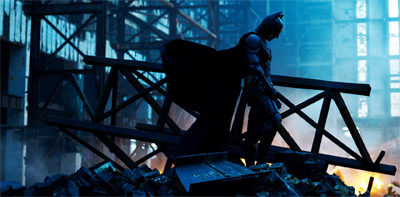
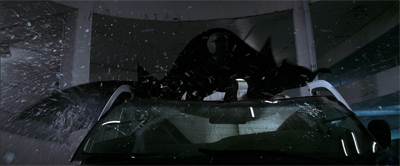
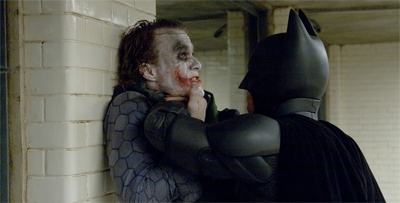
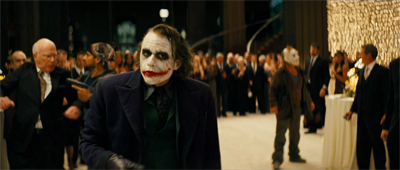
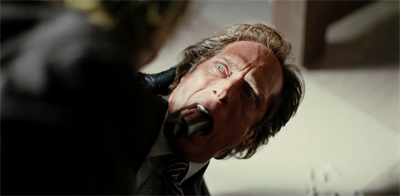
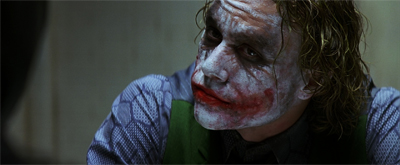

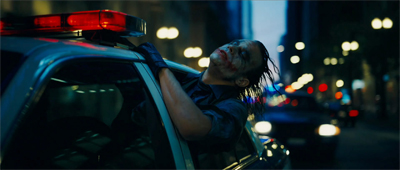
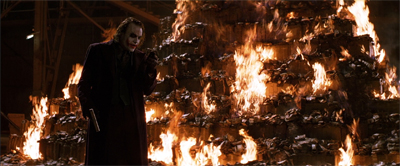
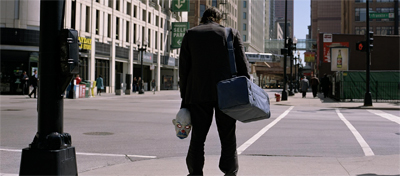
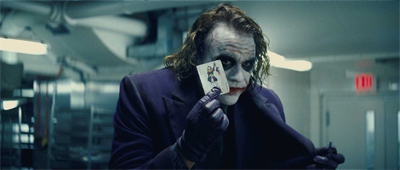
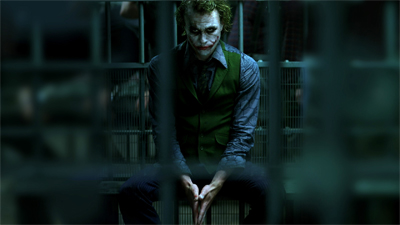
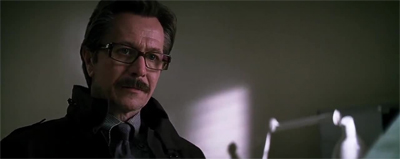
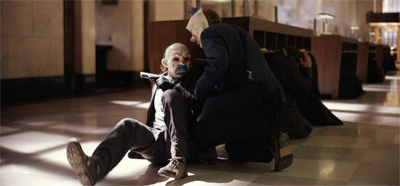

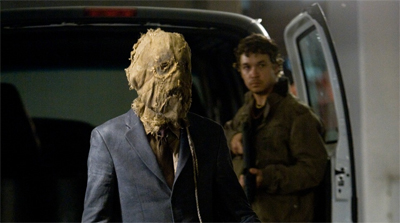
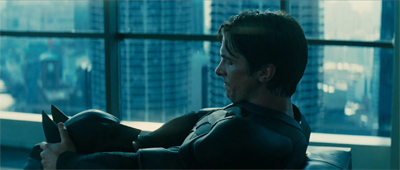
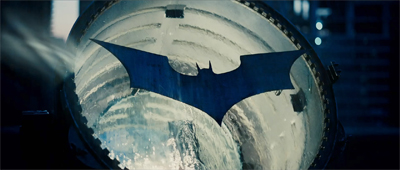
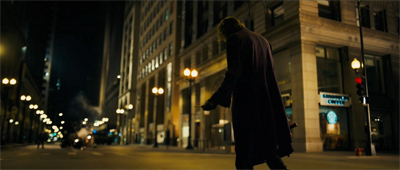
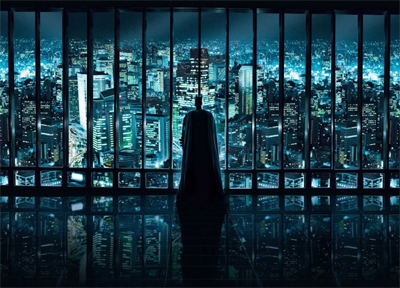
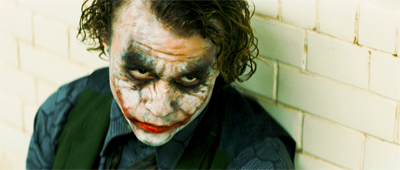
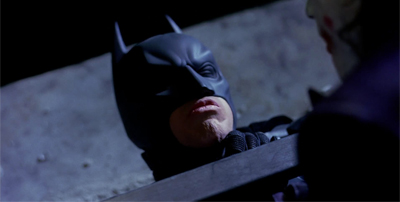
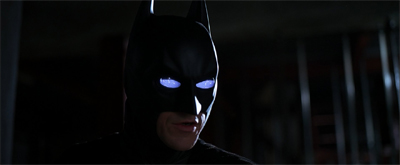
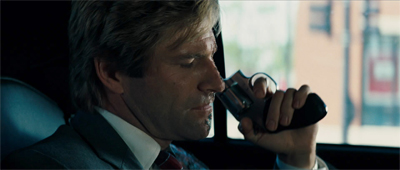
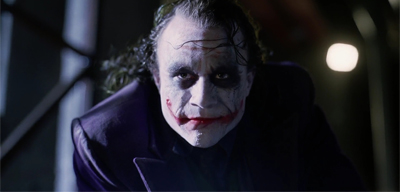
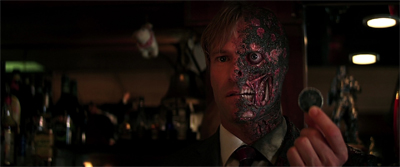
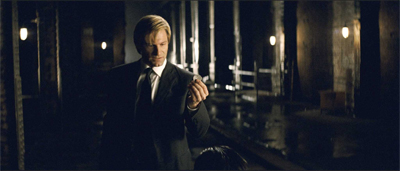
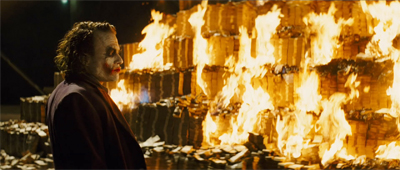
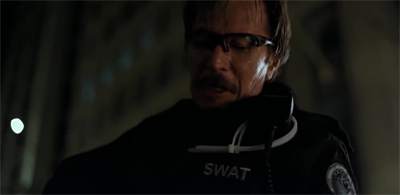

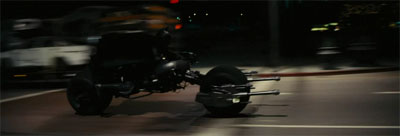
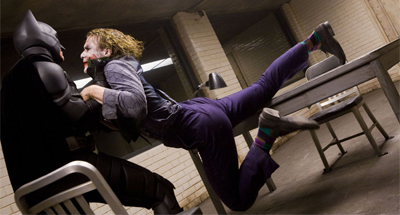

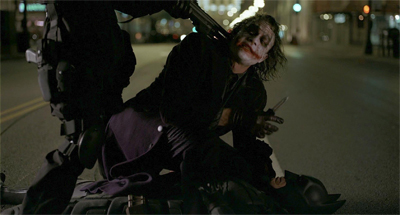





[…] However, the Batman movies he refers to – Christopher Nolan’s Batman Begins and The Dark Knight – are somewhat freak occurances, emerging as two of the best-reviewed films in their own […]
[…] ways, both stories heavily influence the two Christopher Nolan Batman movies (Batman Begins and The Dark Knight) to the point where the notoriously shy-about-his-work Nolan actually provides the introduction to […]
Comparing any other superhero film to Christopher Nolan’s Dark Knight trilogy is insulting to the quality of these films and cinema as an art form.
Over at The Guardian, Tom Shone described the trilogy as this generation’s Great American Film Trilogy. I think he has a point. It hits on all the big twenty-first century themes, from wealth distribution to terrorism to politics of fear, to moral compromise in return for security.